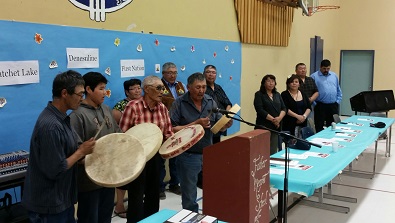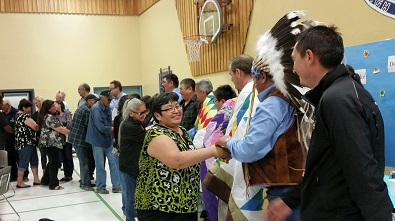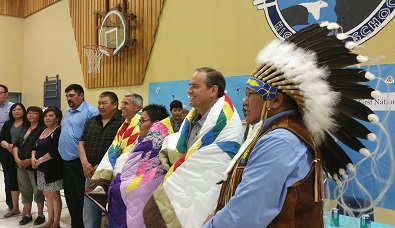Hatchet Lake Dene First Nation has joined six other Athabasca Basin communities in signing a partnership agreement with Cameco and Areva. Geographically, Hatchet Lake is right across the lake from the uranium mining operations.
The initial agreements between the uranium companies and Black Lake, Fond du Lac and the region’s municipalities date back to 1999. They are designed to ensure the communities have a say in resource development in the region, and to ensure that people living in these traditional territories benefit from it.
This week, the two uranium companies are on a tour of the region to celebrate the Ya’Thi Nene Agreement, which means “lands of the north” in Dene. Areva CEO Vincent Martin and Cameco CEO Tim Gitzel made a stop in Wollaston Lake on Tuesday to meet with more than 100 community members to discuss what the agreement will mean to them.
The agreement features the creation of a trust fund and the Ya’Thi Nene Land and Resource Office.
Gitzel was a part of talks with Hatchet Lake back in the 1990s, and said he’s happy things have changed.
“They weren’t comfortable at that time signing the agreement. They were worried about the benefits that would flow to the community, what the impacts would be. I think over the years they’ve watched us, they’ve seen us, they’ve judged us and hopefully now they trust us,” he said.

Band councillors and local leadership spoke to the audience in both English and Dene as they called the partnership “historic.” Negotiations were four years in the making and many of the local leadership who spearheaded the tough bargaining process, like Louis Mercredi, passed away before they could see the fruits of their labour. The region’s chief negotiator Diane McDonald said they worked late nights and weekends to make final tweaks to the agreement in the final weeks before signing off, and said she believes those leaders would have been proud of what they’ve come up with.
Hatchet Lake’s current leader, Chief Bart Tsannie, said agreements like this are in his membership’s best interest because federal transfers don’t cover all of their needs. Tsannie said partnerships with industry are an economic asset in addition to Hatchet Lake business interests like Caribou Transport, fisheries, and air travel.
“We should have done this deal a long time ago,” he said. “We cannot rely on the federal funding, it’s not enough.”
One example of Hatchet Lake’s needs, is how the band cannot afford for all of its young people who apply for funding to receive post-secondary education.
A newly-created trust fund should help ease that pressure.

Cameco and Areva have agreed to help create a land management board. McDonald said this will give the north a voice with any resource company interested in the area.
“It’s not just for Cameco, it’s for whoever has an interest in the land on Athabasca Basin. This would be the primary office for industry and governments to keep in contact, make sure that the duty to consult is met through this office,” she said.
Gitzel said even though the Industry’s in a slump, it’s important to gain the trust of the region to responsibly develop traditional Dene land.
“We want these agreements to surpass the ups and downs of the market and really, that we’re consistent with the people providing the benefits that we say we will whether it’s good times or bad,” he said.
Gitzel and a number of other leaders, like Prince Albert Grand Council Athabasca Vice-Chief Joseph Tsannie, said the importance of traditional land for those who still live off of hunting, trapping, and fishing cannot be ignored by industry.
Tsannie assured people “we are not selling the land,” because treaties are intended to share the wealth of this land. He said he appreciates the respect shown by Cameco and Areva in lobbying efforts and including Dene people in the opportunities of education and employment that their companies allow.
“Once mining companies are gone we can stand on our own two feet” because of the partnerships fought for in this agreement, Tsannie said.
The new Ya’Thi Nene agreement includes the seven communities in the region, which consists of Wollaston Lake, Stony Rapids, Uranium City, Camsell Portage, Black Lake First Nation, Fond du Lac First Nation, and Hatchet Lake First Nation.
It runs as long as Cameco and Areva are operating in the area.
